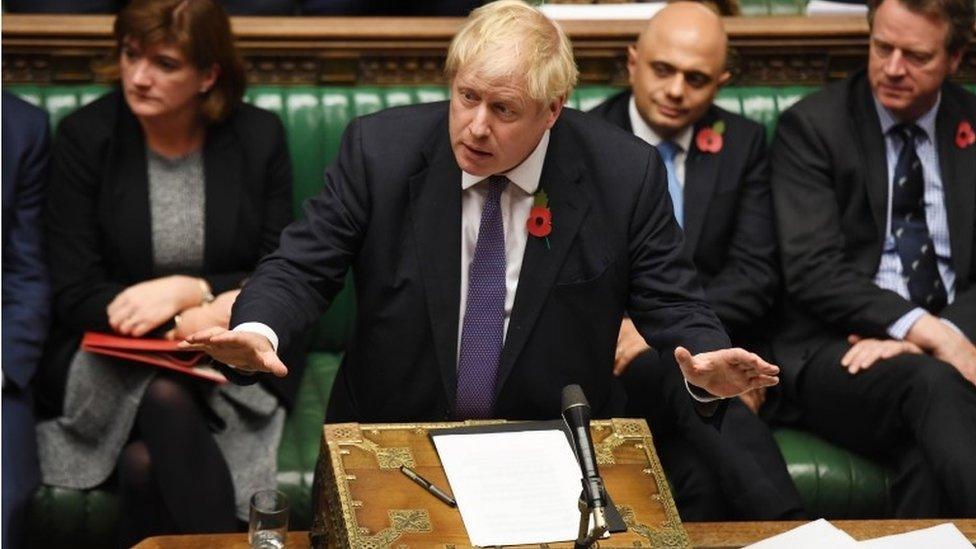Is Parliament moving towards an election?
- Published

Might it be on? Will Boris Johnson get the backing of Parliament to shut up shop and go back and ask voters to recast them, on his fourth time of asking?
He has failed three times before. In the elastic time of politics these days, a Parliamentary day has the strange potential to see several evolutions of the conventional wisdom.
As things stand, however, it seems the prime minister is closer than he has ever been to pushing the button for an election and succeeding at his next attempt.
First off, the powerful cross party coalition of MPs who have worked together to oppose the idea of ever leaving the EU without a deal now have a delay in place until 31 January.
That means not just that Mr Johnson has failed to keep his Halloween promise, but also that there is a window of three months when there is time for something decisive to happen without us leaving the EU with no deal.
Don't get your hopes up, that doesn't mean that anything decisive is in the bag, whichever or whoever's side you are on.
But the deadline by when Parliament has to move has stretched out again, so there's more time to play with.
There is also, as things stand under the current numbers of this Parliament, no majority it seems for holding a second referendum. That's not for want of trying.
Notwithstanding the real time playout of a campaign meltdown, a cross between The Thick of It and The Office with live tweeting thrown in (you can read about the row in the People's Vote campaign, and the row about the row here ), those campaigning for a second referendum have taken what was a distinctively far fetched scenario 12 months ago and turned another referendum into a mainstream ambition in Parliament, advocated by much of the Labour Party, the other opposition parties, and some prominent former Tory Cabinet ministers to boot.
Some of those who have campaigned the hardest for another referendum believe they are now, finally, within touching distance of getting their way.
But both the SNP and the Liberal Democrats seem to have concluded that with these occupants of the green benches, and the current occupant of Number 10, a second referendum is simply not something that's going to happen without a bigger change.
So in theory they are up for an election. In the last 48 hours both of those parties have made plenty of positive noises about backing an election once the delay to Brexit is in place.
The extension is now secure, and while they still won't give a firm commitment to backing the prime minister's push for a poll until they see exactly what he is asking them to vote for on Tuesday, they have made strides towards supporting an election in the last day or two after weeks of only inching forward. There are still wranglings about the date that could delay their support for now.
If the votes from those smaller parties are not forthcoming, then Mr Johnson may have to forget it. Because Labour is not remotely enthusiastic about an election.
That's partly because plenty of their MPs are deeply worried about their standing in the polls, partly because some of them are still worried about Mr Johnson contriving somehow to take us out without a deal next year, and in part too because of concerns about an election at Christmas time.
Some of the PM's most enthusiastic supporters though would like a chance to go to the ballot box, believing that Jeremy Corbyn's strength as a campaigner would transform their fortunes, hoping for some 2017-like improvement in the party's standing.
That's simply not the majority view though, and Labour MPs don't seem remotely likely, for now, to be walking through the lobbies to back a ballot on Tuesday. One senior peer told me on Monday night it would be "a ridiculous thing to do", even though more and more Labour MPs and shadow cabinet ministers too are aware of the risk of looking like the last hold-outs of something that might feel inevitable soon.
Lastly though, an election feels more and more likely because Number 10 has given up for now on getting its Brexit deal through Parliament, and by decoupling that from the demand for an election it makes it in theory more straightforward to achieve.
But that is driving some Tories round the twist, frustrated that Mr Johnson won't have another go at trying to get his timetable through, and then pursue the deal with the EU through its legal stages in Parliament - essentially relax about the election for now, and give his deal a chance to pass calmly instead of playing political roulette.
One MP told me that a group of them made it clear to the PM in person on Monday night that they were deeply unhappy at what one of them described as him "being churlish, and taking his bat and ball home", when he achieved what was said to be impossible by getting a deal in the first place, only to give up when the timetable for it was rejected last week.
Mocking the prime minister's own slogan, the MP joked "that doesn't exactly look like trying to get Brexit done".
Despite a lot of frantic conversations with MPs who might perhaps be enticed to back the deal, the prime minister's calculation is simply that trying again with the risk of defeat and delay is less tempting than trying to get to the ballot box.
Late on Monday the government gave the commitment in the Commons that they would not bring the deal back. The delay from the EU, the commitment that deal is on pause, are both now in place to allow the opposition parties to come on board. But with so many motivations in Parliament constantly ebbing and flowing, Mr Johnson still cannot be sure that in 24 hours he will win.
While the pieces are moving in the direction of an election, they are not quite in place.
